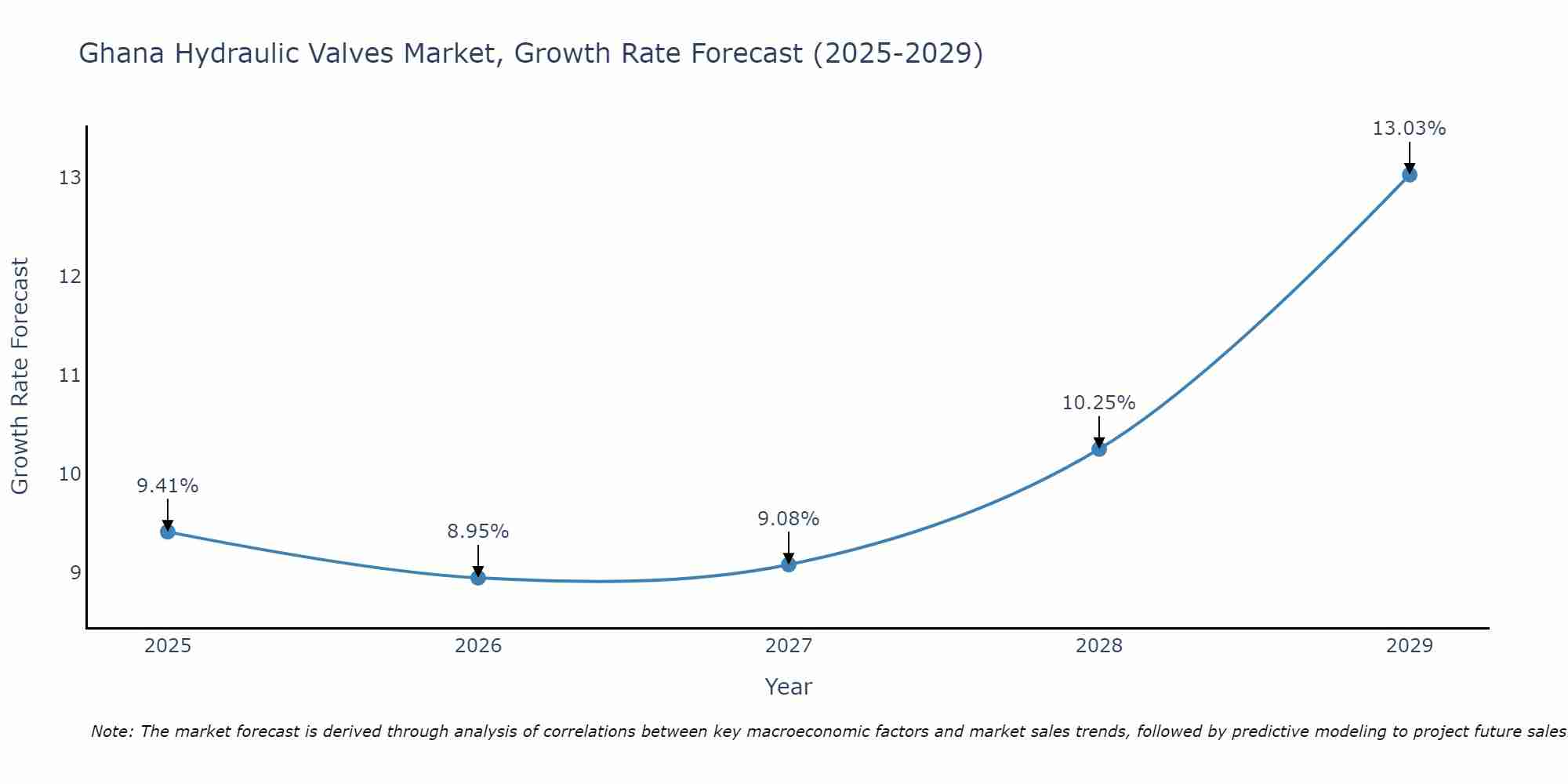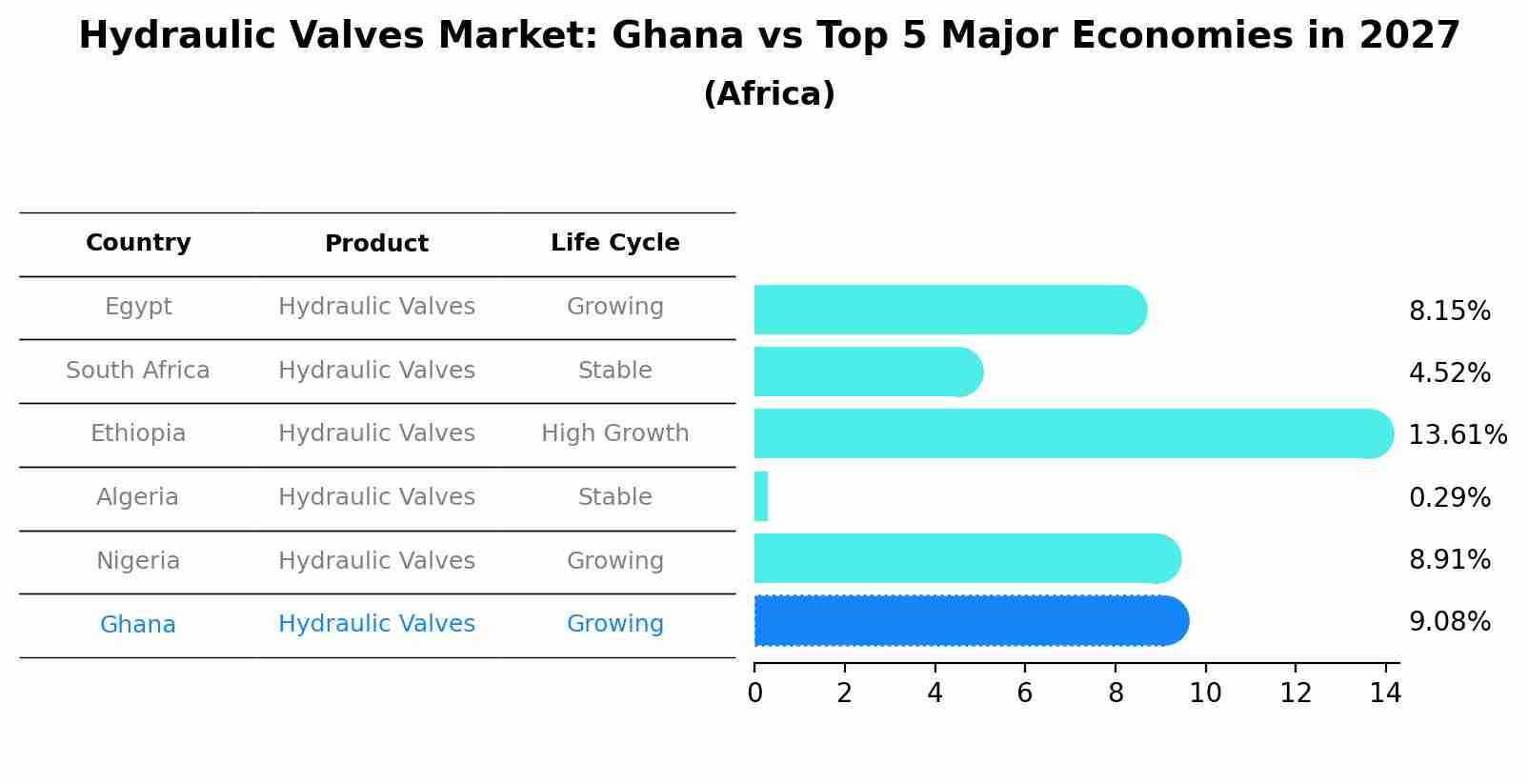Ghana Hydraulic Valves Market (2025-2031) Outlook | Revenue, Forecast, Analysis, Value, Industry, Size, Companies, Growth, Share & Trends
| Product Code: ETC365096 | Publication Date: Aug 2022 | Updated Date: Aug 2025 | Product Type: Market Research Report | |
| Publisher: 6Wresearch | Author: Bhawna Singh | No. of Pages: 75 | No. of Figures: 35 | No. of Tables: 20 |
Ghana Hydraulic Valves Market Size Growth Rate
The Ghana Hydraulic Valves Market is projected to witness mixed growth rate patterns during 2025 to 2029. Commencing at 9.41% in 2025, growth builds up to 13.03% by 2029.

Hydraulic Valves Market: Ghana vs Top 5 Major Economies in 2027 (Africa)
In the Africa region, the Hydraulic Valves market in Ghana is projected to expand at a growing growth rate of 9.08% by 2027. The largest economy is Egypt, followed by South Africa, Ethiopia, Algeria and Nigeria.

Ghana Hydraulic Valves Market Synopsis
The Ghana Hydraulic Valves Market is experiencing steady growth due to increasing industrialization and infrastructure development in the country. The market is driven by the rising demand for hydraulic valves in sectors such as manufacturing, construction, agriculture, and mining. Key players in the market are focusing on product innovation and technological advancements to meet the evolving needs of customers. Additionally, government initiatives to improve the country`s infrastructure are expected to further boost the demand for hydraulic valves in Ghana. The market is characterized by intense competition, with both local and international manufacturers vying for market share. Overall, the Ghana Hydraulic Valves Market is poised for continued growth in the coming years, supported by the country`s economic development and increasing investment in key sectors.
Ghana Hydraulic Valves Market Trends
In the Ghana Hydraulic Valves Market, there is a growing trend towards the adoption of advanced technologies such as smart valves and IoT integration to improve efficiency and performance. Manufacturers are focusing on developing innovative valve solutions that offer better control, precision, and reliability in various industrial applications. Additionally, there is an increasing demand for environmentally friendly and energy-efficient valves to reduce operational costs and minimize environmental impact. Market players are also expanding their product portfolios to cater to diverse industries including oil and gas, mining, agriculture, and construction. Overall, the market is witnessing a shift towards automation, digitalization, and sustainability to meet the evolving needs of customers in Ghana.
Ghana Hydraulic Valves Market Challenges
In the Ghana Hydraulic Valves Market, one of the key challenges is the limited availability of high-quality and reliable products. This market is often flooded with low-cost, inferior quality valves that do not meet industry standards or performance requirements. As a result, customers face difficulties in finding durable and efficient hydraulic valves for their applications, leading to potential operational issues and increased maintenance costs. Additionally, the lack of awareness about the importance of using quality valves further exacerbates the problem. To address these challenges, manufacturers and distributors need to focus on improving product quality, providing better education and training for customers, and implementing stricter regulations to ensure that only certified hydraulic valves are available in the market.
Ghana Hydraulic Valves Market Investment Opportunities
The Ghana Hydraulic Valves Market presents promising investment opportunities due to the country`s growing industrial sector and increasing infrastructure development projects. With a focus on improving efficiency and productivity in various industries such as mining, agriculture, and construction, the demand for hydraulic valves is expected to rise. Investors can explore opportunities in supplying high-quality hydraulic valves that meet the specific needs of these industries, as well as offering maintenance and repair services. Additionally, strategic partnerships with local manufacturers and distributors can help investors establish a strong presence in the market. Given the potential for sustained growth in Ghana`s industrial sector, investing in the hydraulic valves market could offer long-term returns and a solid foothold in the country`s expanding economy.
Jordan Agar Market Government Policies
The Ghanaian government has implemented various policies to regulate and promote the hydraulic valves market in the country. These policies mainly focus on enhancing local manufacturing capabilities, promoting technological advancements, and ensuring compliance with international quality standards. The government has provided support through initiatives such as tax incentives for local manufacturers, technical assistance programs, and capacity-building efforts to improve the skills of industry professionals. Additionally, there are regulations in place to ensure the safety and quality of hydraulic valves imported into the country, with strict enforcement measures against non-compliance. Overall, the government`s policies aim to stimulate growth and competitiveness within the Ghana hydraulic valves market while also fostering a conducive business environment for both local and international stakeholders.
Ghana Hydraulic Valves Market Future Outlook
The future outlook for the Ghana Hydraulic Valves Market appears promising, driven by the country`s growing industrial sector and increasing demand for advanced machinery and equipment. With ongoing infrastructure developments and investments in various industries such as mining, agriculture, and construction, there is a rising need for efficient hydraulic systems, including valves. Additionally, the government`s initiatives to improve access to clean water and sanitation facilities are expected to fuel the demand for hydraulic valves in water treatment and distribution systems. Technological advancements, such as the integration of IoT and automation in hydraulic systems, are also likely to drive market growth. Overall, the Ghana Hydraulic Valves Market is anticipated to experience steady growth in the coming years, presenting opportunities for both domestic and international manufacturers in the industry.
Key Highlights of the Report:
- Ghana Hydraulic Valves Market Outlook
- Market Size of Ghana Hydraulic Valves Market, 2024
- Forecast of Ghana Hydraulic Valves Market, 2031
- Historical Data and Forecast of Ghana Hydraulic Valves Revenues & Volume for the Period 2021 - 2031
- Ghana Hydraulic Valves Market Trend Evolution
- Ghana Hydraulic Valves Market Drivers and Challenges
- Ghana Hydraulic Valves Price Trends
- Ghana Hydraulic Valves Porter's Five Forces
- Ghana Hydraulic Valves Industry Life Cycle
- Historical Data and Forecast of Ghana Hydraulic Valves Market Revenues & Volume By Type for the Period 2021 - 2031
- Historical Data and Forecast of Ghana Hydraulic Valves Market Revenues & Volume By Directional Control Valves for the Period 2021 - 2031
- Historical Data and Forecast of Ghana Hydraulic Valves Market Revenues & Volume By Pressure Control Valves for the Period 2021 - 2031
- Historical Data and Forecast of Ghana Hydraulic Valves Market Revenues & Volume By Flow Control Valves for the Period 2021 - 2031
- Historical Data and Forecast of Ghana Hydraulic Valves Market Revenues & Volume By End-Use for the Period 2021 - 2031
- Historical Data and Forecast of Ghana Hydraulic Valves Market Revenues & Volume By Construction Machinery for the Period 2021 - 2031
- Historical Data and Forecast of Ghana Hydraulic Valves Market Revenues & Volume By Agriculture Machinery for the Period 2021 - 2031
- Historical Data and Forecast of Ghana Hydraulic Valves Market Revenues & Volume By Material Handling for the Period 2021 - 2031
- Historical Data and Forecast of Ghana Hydraulic Valves Market Revenues & Volume By Automotive for the Period 2021 - 2031
- Historical Data and Forecast of Ghana Hydraulic Valves Market Revenues & Volume By Oil & Gas for the Period 2021 - 2031
- Historical Data and Forecast of Ghana Hydraulic Valves Market Revenues & Volume By Power Generation for the Period 2021 - 2031
- Historical Data and Forecast of Ghana Hydraulic Valves Market Revenues & Volume By Metal & Mining for the Period 2021 - 2031
- Historical Data and Forecast of Ghana Hydraulic Valves Market Revenues & Volume By Others for the Period 2021 - 2031
- Historical Data and Forecast of Ghana Hydraulic Valves Market Revenues & Volume By Flow Rate for the Period 2021 - 2031
- Historical Data and Forecast of Ghana Hydraulic Valves Market Revenues & Volume By Below 50 L/min for the Period 2021 - 2031
- Historical Data and Forecast of Ghana Hydraulic Valves Market Revenues & Volume By 50-200 L/min for the Period 2021 - 2031
- Historical Data and Forecast of Ghana Hydraulic Valves Market Revenues & Volume By 201-500 L/min for the Period 2021 - 2031
- Historical Data and Forecast of Ghana Hydraulic Valves Market Revenues & Volume By 501-1000 L/min for the Period 2021 - 2031
- Historical Data and Forecast of Ghana Hydraulic Valves Market Revenues & Volume By Above 1000 L/min for the Period 2021 - 2031
- Historical Data and Forecast of Ghana Hydraulic Valves Market Revenues & Volume By Operation for the Period 2021 - 2031
- Historical Data and Forecast of Ghana Hydraulic Valves Market Revenues & Volume By Manual for the Period 2021 - 2031
- Historical Data and Forecast of Ghana Hydraulic Valves Market Revenues & Volume By Automated for the Period 2021 - 2031
- Ghana Hydraulic Valves Import Export Trade Statistics
- Market Opportunity Assessment By Type
- Market Opportunity Assessment By End-Use
- Market Opportunity Assessment By Flow Rate
- Market Opportunity Assessment By Operation
- Ghana Hydraulic Valves Top Companies Market Share
- Ghana Hydraulic Valves Competitive Benchmarking By Technical and Operational Parameters
- Ghana Hydraulic Valves Company Profiles
- Ghana Hydraulic Valves Key Strategic Recommendations
Frequently Asked Questions About the Market Study (FAQs):
- Single User License$ 1,995
- Department License$ 2,400
- Site License$ 3,120
- Global License$ 3,795
Search
Thought Leadership and Analyst Meet
Our Clients
Related Reports
- Afghanistan Apparel Market (2026-2032) | Growth, Outlook, Industry, Segmentation, Forecast, Size, Companies, Trends, Value, Share, Analysis & Revenue
- Canada Oil and Gas Market (2026-2032) | Share, Segmentation, Value, Industry, Trends, Forecast, Analysis, Size & Revenue, Growth, Competitive Landscape, Outlook, Companies
- Germany Breakfast Food Market (2026-2032) | Industry, Share, Growth, Size, Companies, Value, Analysis, Revenue, Trends, Forecast & Outlook
- Australia Briquette Market (2025-2031) | Growth, Size, Revenue, Forecast, Analysis, Trends, Value, Share, Industry & Companies
- Vietnam System Integrator Market (2025-2031) | Size, Companies, Analysis, Industry, Value, Forecast, Growth, Trends, Revenue & Share
- ASEAN and Thailand Brain Health Supplements Market (2025-2031) | Strategy, Consumer Insights, Analysis, Investment Trends, Opportunities, Growth, Size, Share, Industry, Revenue, Segments, Value, Segmentation, Supply, Forecast, Restraints, Outlook, Competition, Drivers, Trends, Demand, Pricing Analysis, Competitive, Strategic Insights, Companies, Challenges
- ASEAN Bearings Market (2025-2031) | Strategy, Consumer Insights, Analysis, Investment Trends, Opportunities, Growth, Size, Share, Industry, Revenue, Segments, Value, Segmentation, Supply, Forecast, Restraints, Outlook, Competition, Drivers, Trends, Demand, Pricing Analysis, Competitive, Strategic Insights, Companies, Challenges
- Europe Flooring Market (2025-2031) | Outlook, Share, Industry, Trends, Forecast, Companies, Revenue, Size, Analysis, Growth & Value
- Saudi Arabia Manlift Market (2025-2031) | Outlook, Size, Growth, Trends, Companies, Industry, Revenue, Value, Share, Forecast & Analysis
- Uganda Excavator, Crane, and Wheel Loaders Market (2025-2031) | Strategy, Consumer Insights, Analysis, Investment Trends, Opportunities, Growth, Size, Share, Industry, Revenue, Segments, Value, Segmentation, Supply, Forecast, Restraints, Outlook, Competition, Drivers, Trends, Demand, Pricing Analysis, Competitive, Strategic Insights, Companies, Challenges
Industry Events and Analyst Meet
Whitepaper
- Middle East & Africa Commercial Security Market Click here to view more.
- Middle East & Africa Fire Safety Systems & Equipment Market Click here to view more.
- GCC Drone Market Click here to view more.
- Middle East Lighting Fixture Market Click here to view more.
- GCC Physical & Perimeter Security Market Click here to view more.
6WResearch In News
- Doha a strategic location for EV manufacturing hub: IPA Qatar
- Demand for luxury TVs surging in the GCC, says Samsung
- Empowering Growth: The Thriving Journey of Bangladesh’s Cable Industry
- Demand for luxury TVs surging in the GCC, says Samsung
- Video call with a traditional healer? Once unthinkable, it’s now common in South Africa
- Intelligent Buildings To Smooth GCC’s Path To Net Zero


















